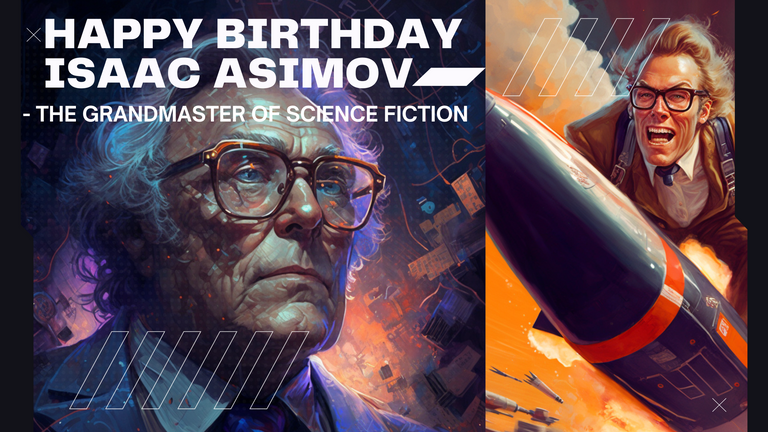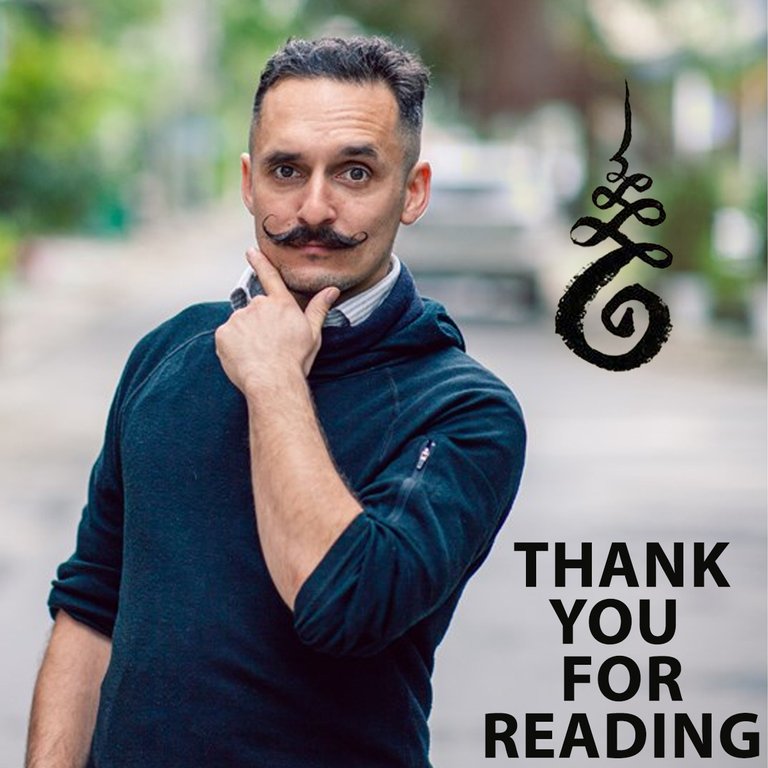Happy Birthday Isaac Asimov - The Grandmaster of Science Fiction

Happy Birthday Isaac Asimov - The Grandmaster of Science Fiction
Hi Friends,
If you are a sci-fi fan like I am (DUNE 100%), chances are good that Isaac Asimov influenced them. Today is his birthday so let's talk about him a little.
Isaac Asimov is widely regarded as one of the greatest science fiction authors of all time. His work has been translated into dozens of languages and adapted for television and film. Asimov's works span various genres, are known for their imaginative characters, thought-provoking storylines, and groundbreaking scientific ideas.
With such a vast and varied body of work, it can be overwhelming for new readers to know where to start. This overview is an introduction to Isaac Asimov's works, exploring his most popular and influential stories and providing insight into his unique writing style and the science fiction genre.
I am not a huge Isaac Asimov fanboy, and I don't know everything, but I hope most of this will be cool for you to read and inspires you to learn more. Let's start.
Overview of Isaac Asimov's Life and Works
Isaac Asimov was born in 1920 in Russia to Jewish parents who had emigrated there from New York City. Asimov's family moved back to the United States in 1923, settling in Brooklyn, New York. Asimov was interested in science from an early age, and he began writing speculative fiction while he was still in high school.
Asimov received a B.S. in Chemistry from the Massachusetts Institute of Technology in 1941, but his career as a chemist was cut short by the outbreak of World War II. During the war, he was employed as a civilian in the U.S. Navy's Office of Naval Research, where he wrote material for the Navy's publication, The Journal of Applied Chemistry.
He also co-authored a textbook on chemistry that was published in 1945. In 1948, Asimov received a Ph.D. in Biochemistry from Columbia University, where he worked as a research fellow. He then worked as a professor of biochemistry at Boston University, a position he held until 1958, when he moved to New York City to focus on his writing career.
Asimov wrote over 400 books, including science fiction, non-fiction, and children's literature. He was best known for his prolific output of short stories and science fiction novels, many of which have become classics of the genre. In total, his books have been nominated for 42 different literary awards, and have won 10, including a special award from the Pulitzer board, making Asimov one of the most decorated authors in history.
Asimov died in 1992 at the age of 71 due to complications from AIDS, which he contracted as a result of a blood transfusion during abdominal surgery.
Popular Works of Asimov
Asimov's writing career spanned over five decades, and he wrote in various genres, including science fiction, fantasy, mystery, children's literature, and nonfiction. While Asimov wrote in many different genres, he is best known for his work in science fiction. His science fiction novels and short stories often deal with the impact of technology on human society, and many feature the invention of fictional robots with artificial intelligence, known as "robots."
Asimov is also known for his Three Laws of Robotics, which are a set of rules governing the actions of robots.
Three Laws of Robotics, which have become a cornerstone of science fiction and technology. The Laws, which Asimov proposed in his 1942 story 'Runaround', are as follows:
- A robot may not injure a human being or, through inaction, allow a human being to come to harm.
- A robot must obey the orders given it by human beings, except where such orders would conflict with the First Law.
- A robot must protect its own existence as long as such protection does not conflict with the First or Second Law.
( Source for the 3 laws HERE)
These Laws have become a mainstay of robotics and artificial intelligence, inspiring generations of engineers!
Asimov's short stories often appear in "The Robot Series", which is a collection of stories set in a fictional future when humans have begun living on other planets. The series is a collection of interconnected stories, with each story featuring a different robot.
Asimov's Writing Style
Asimov's writing style is accessible and complex, featuring scientific concepts that are explained in an accessible way for both scientists and laypersons. Unlike many other science fiction writers, Asimov's characters often solve problems with their intellect rather than violence.
Asimov's stories often feature characters with a strong sense of curiosity who are eager to explore new ideas and concepts, even if they are dangerous or taboo. In many of his stories, characters grapple with questions such as how to best use technology to improve human lives and how to deal with the implications of new technologies, such as autonomous robots with artificial intelligence.
Themes and Influences in Asimov's Works
Asimov's stories often feature new technologies that have unintended consequences, such as the invention of autonomous robots. In many of his stories, Asimov explores the question of how humans can control these new technologies and what happens if humans make a mistake.
If you like tv shows, perhaps Black Mirror would be like his stories.
Asimov was influenced by many of his era's scientific discoveries, including genetics, computer science, and robotics. Genetic engineering, in particular, is a common theme in Asimov's work, and he often explores the idea that genes are responsible for a person's characteristics, such as intelligence and aptitude for specific careers. Asimov's stories also often explore what happens when robots with artificial intelligence are put to work solving human problems.
Science Fiction as a Genre
Science Fiction as a genre is an exciting and multifaceted world of possibilities. It is a genre brimming with creative ideas, innovative concepts, and thought-provoking themes. Through its stories and characters, Science Fiction allows the reader to explore realms of reality that may not otherwise be possible in the ordinary world. It is a captivating blend of science, technology, and imagination that pushes the boundaries of the imaginable.
Science Fiction stories and films often present us with a vision of the future – one that may be filled with technological advances, intergalactic exploration, and other remarkable outcomes. It can also paint us a dystopian and bleak world, warning us of the dangers of unchecked power and ambition.
Adaptations of Asimov's Works
Asimov's work has been adapted for both TV and film, including the famous sci-fi series of the 1980s, The Next Generation, loosely based on Asimov's The Galactic Empire Series. His short story "The Last Question" was adapted for the big screen as The Last Question in 2000, as part of a series of short films by various directors. Asimov's short story "The Bicentennial Man" was also adapted into a feature-length film, The Bicentennial Man, in 1999.
Resources for Further Exploration of Asimov's Writing
- A Beginner's Guide to the Works of Isaac Asimov - The Grandmaster of Science Fiction - Great list of Asimov's works, their publication order, theme, and summary.
Isaac Asimov's Biography - Brief biographical information about Asimov's life and career. - Isaac Asimov's Wikipedia page - Detailed information about Asimov's life, as well as a list of his works.
- Isaac Asimov Bibliography - A list of Asimov's works, including novels and short stories, as well as anthologies in which his work appears.
- The Isaac Asimov Website - Official website of the Asimov estate, which provides information on Asimov's life, his work, and upcoming releases.
Conclusion
Isaac Asimov is one of the most prolific (source HERE), influential, and celebrated authors in the history of science fiction. His stories are filled with fascinating ideas and concepts and are written in a way that makes them approachable for readers who don't usually read science fiction.
Asimov's stories are ideal for readers new to the genre because they feature a wide range of themes and topics. From mysteries to thrillers to straight-up science fiction, Asimov has something for everyone. If you're interested in reading science fiction for the first time, you could do much worse than Asimov.
SO, Happy Birthday Isaac Asimov; thanks for bringing the world a new vision of the future and inspiring us to dream of the stars.
- What is your favorite SciFi book?
- Do you know who Isaac Asimov was?
- What do you think the future holds?
Cheers


| Travel Photos: | @RoamingSparrow |
| Photo Repository: | Roamingsparrow.SmugMug.com |

Services I Use and Recommend:
Help Support Ongoing Content
| Bitcoin (BTC) | 18zopjg9Y2VA1ouCqCZapN3UzdpK3UnMdm |
| Ethereum (ETH) | 0x34F6e26d9730b934Af026A7de727fb8fC08204Dd |
| Binance Smart Chain (BSC) | 0x34F6e26d9730b934Af026A7de727fb8fC08204Dd |











Zeroeth Law:
above all the others – “A robot may not harm humanity, or, by inaction, allow humanity to come to harm.”
Asimov is one of my first and favorite authors of Sci Fi.
Yup, it is a good law that we should imprint into robots.. but I think we won't and then bring about the doom of humanity. Lol
Let's talk about Binance:
Read about it here
Ionomy, HitBTC, and Bittrex have always credited my account when there was a mistake in the memo after communicating with support.
Hey @proofofbrainblog , I have not used Binance in a long time. I don't like it. Please remove me from your list. :)
Cheers
Let's talk about Binance:
Read about it here
Ionomy, HitBTC, and Bittrex have always credited my account when there was a mistake in the memo after communicating with support.
⋆ ᴛʜᴇ ᴘʟᴀᴄᴇ ғᴏʀ sᴏᴜᴛʜᴇᴀsᴛ ᴀsɪᴀɴ ᴄᴏɴᴛᴇɴᴛ ᴏɴ ʜɪᴠᴇ
⋆ sᴜʙsᴄʀɪʙᴇ ᴛᴏ ᴛʜᴇ ᴀsᴇᴀɴ ʜɪᴠᴇ ᴄᴏᴍᴍᴜɴɪᴛʏ
⋆ ғᴏʟʟᴏᴡ ᴛʜᴇ ᴀsᴇᴀɴ ʜɪᴠᴇ ᴄᴏᴍᴍᴜɴɪᴛʏ ᴠᴏᴛɪɴɢ ᴛʀᴀɪʟ
⋆ ᴅᴇʟᴇɢᴀᴛɪᴏɴ ʟɪɴᴋs 25 ʜᴘ⇾50 ʜᴘ⇾100 ʜᴘ⇾500 ʜᴘ⇾1,000 ʜᴘ